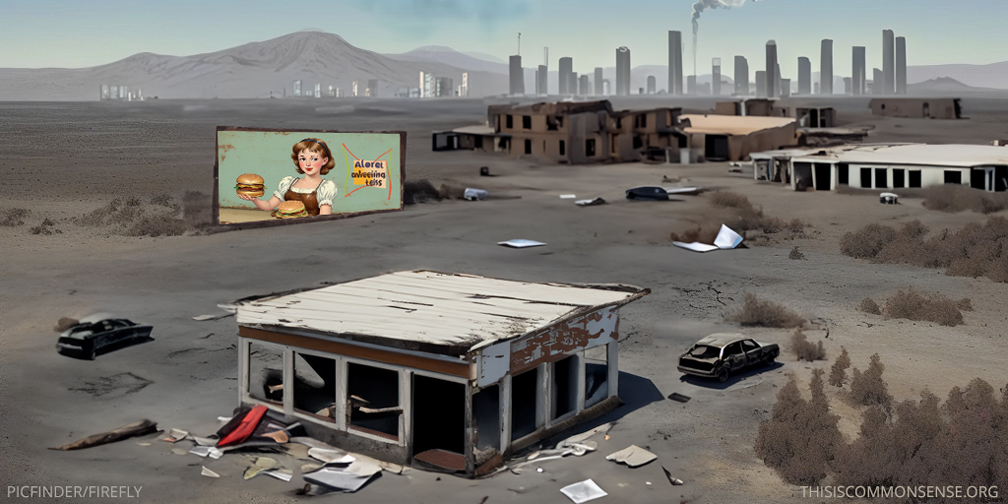Could a barren, charred, devastated landscape be the actual intended goal?
In California as in Washington, lawmakers and chief executives apparently have a long list of nice things to destroy and are crossing them off one by one, as if on the payroll of aliens from outer space wanting to conquer earth without doing very much
Part 99-C of the plan is to price entry-level labor and entry-level restaurant dining out of the market by hiking the minimum wage of fast-food workers even further beyond the market rate for the labor and its actual productive value to employers: now to $20 an hour.
Already, prices for restaurant meals are going up, and restaurant workers are being laid off.
The $20 minimum is a compromise that restaurant owners accepted in lieu of probably paying a $22 per hour minimum. Like letting burglars take only most of the silverware and letting them return at will.
Even more looting of employers is to come, if employee and activist Angelica Hernandez has her way. “We’re going to have to keep speaking up and striking to make sure we are heard.” She wants her dough and doesn’t care about the consequences for others. Policymakers rush to appease her and those like her.
So is omni-destruction the actual intended goal?
Or is it that the mental powers of the crusaders and politicians and too many voters don’t extend so far as the relationship between cause and effect?
This is Common Sense. I’m Paul Jacob.
Illustration created with PicFinder and Firefly
—
See all recent commentary
(simplified and organized)

3 replies on “Dining Out on Cause and Effect”
Those on the political left misunderstand the very nature of value, and regard any economic system as intelligible in terms of a kernel the performance of which is purely a matter of technical considerations so that the distribution of production beyond what is necessary to support the kernel is merely a matter of social power. In this context, those on the left basically look at GDP, and imagine simply dividing it according to their notions of equity.
Regarding the state as the engine which can effect an equitable distribution, they give it — and thus our rulers — ever more power. Our rulers and their useful idiots make sure that those on the left don’t have to confront a real challenge to their preconceptions. Part of the strategy is to ensure that opposition to the left is dominated by the right — by conservatives or by right-wing populists, instead of by liberals. (Indeed, note how left and right have conditioned people to misuse the word “liberal”, making it more difficult to imagine any opposition to the left other than a right-wing.)
Those on the left will diagnose a decline in employment amongst those without better work histories and skills as a failure of the market-system, and prescribe action by the state. Those on the left will diagnose the disappearance of inexpensive restaurants variously as a consequence of capitalistic greed or as part of a desirable transition towards a “sustainable” system of communal kitchens and dining.
Got on increasingly wonderful collection of copycat recipes.
I need fast food less than fast food needs me.
“Or is it that the mental powers of the crusaders and politicians and too many voters don’t extend so far as the relationship between cause and effect?”
Alas, I fear this is the case. And yet most, I think, are mentally CAPABLE of understanding, but instinctively consider it in their interest not to go there, so go into “I can’t hear you!” mode if exposed to the notion.